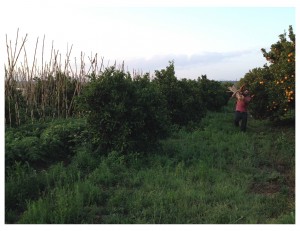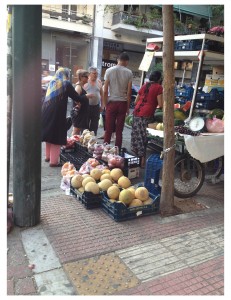Engaged Anthropology Grant: James Verinis

James Verinis is an Adjunct Professor at Roger Williams University. In 2009 he received a Dissertation Fieldwork Grant to aid research on “New Immigrant Farmers and the Globalization of the Greek Countryside,” supervised by Dr. Thomas M. Wilson. In 2015 Dr. Verinis received an Engaged Anthropology Grant to aid engaged activities on “Rural Greek Rebound in/of Crisis”.
While I researched a number of rural/agrarian problems between 2008 and 2010 in the Greek prefecture of Laconia, the roles Southeastern European immigrants play in maintaining traditional rural Greek ways of life were the most remarkable aspects of my dissertation fieldwork findings. Faced with global forces that threaten their survival (stigma and depopulation as well as cheap Argentine lemons or high quality olive oil from California, for example), unprecedented relationships have developed between Greeks and some non-Greek residents as they become kin through marriage and baptism, engage in reciprocal relations, and share community life. This has remained the case in more recent years, despite reports that immigrants are exiting Greece as a result of the financial crisis.
In my Engaged Anthropology Grant proposal I suggested that European Union, state, and local political policy can facilitate immigrant incorporation into rural development schemes. Structural integration of farming knowledge and technology across this new diversity of stakeholders is wholly absent. The Young Farmer Program, an EU-wide program to assist new farmers, is not equipped to administer aid to non-nationals despite official rhetoric. Programs in the United States such as New Farmer Development highlight opportunities within a global migratory paradigm to support values inherent to traditional agricultural landscapes, rural entrepreneurship, and diversified farming systems as well as protect biodiversity and ameliorate social conflict between groups. I proposed a pilot program to take advantage of similar opportunities that was endogenous in spirit but based on American interests in such policy initiatives.

My proposal ignored the realities of Greek experience. Rural Greek communities have been increasingly ambivalent about the state since the early 1990’s. A general distrust of core EU countries to the north has pervaded Greek life since the onset of austerity measures in 2010. The financial crisis has also undermined prospects for any rural development initiatives. In my failure to discover interest in legislative measures, I discovered solidarity networks amongst disparate groups that offset the absence of and were preferable to such public policy. All Greek farmers, non-Greek farmers, and political representatives I spoke with in 2016- even a highly respected rural sociologist, now secretary general of the Greek Ministry of Rural Development and Food- deflected, seemed bewildered by, or just plain ignored my queries about the potential for political intervention. The newly appointed Laconian municipal agronomist suggested he had nothing to do with the Young Farmer Program. Article 13A, added to Law 4251/2014 by the Greek Ministry of Rural Development and Food in 2016, now provides for the legal registration of irregular ‘third country nationals’ yet such basic measures are so relatively late in coming and without practical application or benefit to Greeks or non-Greeks that rural residents continue to rely on informal networks.
This informal ‘resistance’ is hardly a neat opposition, but it is ubiquitous to the point where I identify it as a sodality. Contemporary solidarity movements or kínisi allilegií in Greece provide a vast array of people with such essentials as health care, legal aid, and food. The ‘no middleman movement’ or ‘potato movement’ (‘kínima tis patátes’), which facilitates the direct sales of agricultural produce is one such movement or network. Such novel networks that produce and distribute food and save and exchange seeds have formed as resistant responses to neoliberal campaigns that intensify and commodify agriculture, making small-scale food production increasingly impossible. In looking into new solidarity phenomena and visiting with my most evocative interlocutors in Laconia in 2016, I began to draw a connection between rural solidarity movements in global Greek countrysides and these other novel networks.
Albanian farmer Lefteris now conspires with neighboring Greeks to frighten Roma away from his fields in the village of Asteri, allowing Roma to think, as the police also suggest, that he is a ‘dangerous Albanian’. While this linguistic tool is a byproduct of an exploitive relationship in which Lefteris would historically suffer, non-Greeks such as Lefteris now wield some of these tools in a co-conspiracy with Greeks for their mutual benefit. Vis-à-vis these alliances they can pursue small-scale agriculture and maintain traditional rural Greek ways of life in light of global capitalist agri-business trends.
Mitsos, another Albanian I often worked with between 2008 and 2010, also plays significant roles in these informal rural Greek sodalities. One morning in the summer of 2016 an old Greek man named Pandelis described to Mitsos, whom he has known for nearly a quarter century, problems he had been having passing a kidney stone. Mitsos instructed him, in some detail, how to make a tea from the stomach of a chicken so as to facilitate relief. As Albanians have long had less access to western biomedicine, Greeks now rely on Albanians for alternative therapies in now desperate financial times. Beyond the obvious depth of their relationship, the exchange of this traditional rural remedy is indicative of a larger set of responsibilities that rural Greek residents of various ethno-nationalities now have to each other. They increasingly share kéfi– ‘good humor’ or ‘good life’, outside of social hierarchies, official politics, and capitalist markets (Papataxiarchis 1994)). Is kéfi a way for scholars to comprehend new globalized rural relationships and solidarity movements in response to conventional political failings? I have been forced to reconsider the problem.